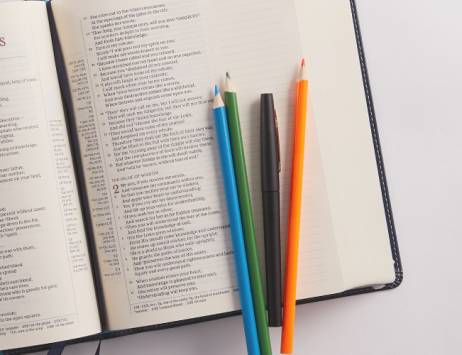The spiritual discipline of Bible reading is like food for our souls and minds. We long for the pure milk of the Word as we grow in our salvation. But as we engage our whole hearts in the intake of Scripture, there is a benefit to developing a posture of active listening as we hear what God has said. The practice of journaling can aid in thorough reflection and bring joy to our time of study.
Slow Down
Journaling comes more naturally to some than others, but the act of writing forces us to slow down and consider what we are taking in. It offers an additional step of reflection, beyond the input of reading. The pen in our hands gives an outlet for response. While we can’t add to what the Bible says, we can respond just as Moses and Deborah did when they wrote praises after seeing the acts of God.
There are multiple ways that one can approach journaling, and the key is to find what is most effective for your learning and writing style. The beauty of journaling is that while our journals can be shared one day if we choose, we can also keep them private, so the fear and intimidation that might come from writing for a public audience is removed.
1. Write in the Bible
The most effective way for me to journal the Bible has been to write in my physical copy of the Scriptures. I have done this for decades, through three different Bibles. (And yes, when I changed to a new Bible, I did transfer many of my notes into the new margins.) The benefits of this are that I always come back to those notes every time I read. I can come to a passage in Exodus and see what struck me five years ago, or I can see how Psalm 37 helped me walk through a difficult time.
2. Copy the Bible Verse
Another way I journal the Bible is to pursue the most straightforward way possible. I simply write out the verses I am studying, word for word. It can be on a sheet of paper, in a bound journal, or on a card that I carry around to remind me of what He has said. The act of physically writing God’s Word out exercises a different part of my brain than reading silently or even reading aloud. It leads me to ponder on those words and aids in Scripture memory, while giving me something to go back to as I put His truths in my heart.
3. Journal Your Prayers
Finally, journaling prayers in response to what I have read can be a powerful exercise. Writing prayers is a different experience from silent prayer or prayer aloud. Sometimes I need to cry out to God on my knees. Sometimes I have no words and I just need to look to the One who is interceding for me. But sometimes the act of articulating my prayers in writing can help me to stop for a moment, remember what is true, and turn my heart towards hope.
I have seen many carry out these practices in beautiful and artistic ways, with drawings to supplement their notes or intricate hand lettering that enhances what is written. While this has not worked as well for me because of my own skill level, I have been deeply blessed by how others have used graphic art as a form of expression.
Words are a gift. God spoke the world into existence with words, He used words to share the Good News of the gospel, and He gave us the power of words to speak back to Him in relationship.







1 reply on “3 More Ways to Journal the Bible”
I was brought up to think of the Bible as a Holy Book. Each page was regarded as sacred. Never could I smudge it or wrinkle it and certainly not commit my untamed script to it! The result is, the Bibles I possess have such fine onion skin pages I take utmost care and, for fear of mussing it up, simply don’t read it everyday as I yearn to. Don’t you sell a study Bible that lets me lose myself in what is written rather than caring for it physically… nice thick pages for journaling without a guilty conscience? Thank you.